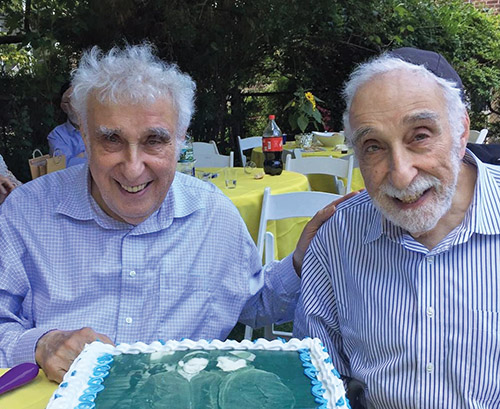
As many readers may have heard, my dear uncle, Rabbi Dr. Marvin Schick, z”l, recently passed away. He was my father Allen’s twin brother, and my Dad just finished a most challenging COVID-19 shiva period after losing his most beloved twin.
Allow me to share a few words about the world that Uncle Marvin was born into. It was 1934, and the height of the Great Depression. His father, my grandfather, Rabbi Joseph Schick, z”l, was the well-respected rabbi at Manhattan’s West Side Jewish Center. He used to minister to fellow Jews in jail, some formerly wealthy, who in a Les Misérables twist of fate were serving time for theft born from destitution. My grandmother was raising four little children, and though their rabbinic salary was meager, with no parsonage, they were building a happy family.
That all changed drastically in 1938, when my zeidy died suddenly from an illness that would be easily treated today. (Although with COVID-19, we all realize more deeply that Hashem is the ultimate healer.) Just a few weeks after his petirah, my bobbie (we called her “Bobbie,” not “Bubby”) and her brood were evicted from their Chelsea apartment, and with no savings, they were in desperate straits. Fearing she had no choice, my grandmother sent Marvin and my father to an orphanage, where they remained for five haunting years.
The two older siblings stayed to help Bobbie, and she was able, through superhuman effort, to get on her feet by starting what would become one of the most famous kosher bakeries ever, Schick’s Bakery of Boro Park. She visited my uncle and father every week religiously, taking three buses to get there. However, for the two little ones, the trauma of being torn asunder from their family at such a tender age left its lifelong mark. Both chose to turn their experience into a redemptive process.
In Marvin’s case, it motivated him to lead a life of total and utter commitment to the klal: First as a devoted student and confidant of Harav Aharon Kotler, zt”l, and later through his resurrection of the storied Rabbi Jacob Joseph School (RJJ) to become a network of major school and yeshivos. He spent the last 20 years of his career as senior consultant at the AviChai Foundation, where his fingerprints are on over 150 day school buildings built through his efforts.
Most of all, Uncle Marvin ate, drank and (barely) slept Jewish education. Indeed, this is what I want to highlight for the rest of this article, while at the same time responding to the recent commentaries emerging from Gershon Distenfeld’s passionate editorial (“A Viral Opportunity,” April 23, 2020).
Though thought of as quaint today, Marvin believed that it was the responsibility of the community to support the day schools. Period. By way of example, in a seminal article from the early ‘90s, Marvin argued that the philanthropic overemphasis on bloated Jewish agencies, boutique causes and duplicative nonprofits undermined the financial security of the day school movement, especially in smaller communities where dollars were more scarce.
He made it clear in many writings and speeches that the number-one priority of the communal dollar should be chinuch. He wrote: “Education is one of the two key functions of Jewish schools. The other, often more important function is religious socialization, the process whereby young children are taught to understand and accept the principles of our faith. This role transcends courses and curriculum and explains why all who care about Jewish continuity now place so much hope in all-day Jewish schools.”
Whether today’s day schools are fulfilling that mandate is a different, though hugely important discussion. Another particularly important discussion is whether the boards governing these schools are acting in ways that honor the hard-earned dollar of its constituents.
For now, though, the question must be asked: If communities did indeed support day schools in the way Marvin suggested, would tuition be vastly more affordable? Would the inordinate burden on “wealthy” Jewish families be lifted to some degree? As this article is primarily an appreciation of my special uncle’s life, not a polemic, I will leave those points for your discussion.
Turning back to his life, though, may help answer the questions. Marvin loved the day school movement. Even more, he loved the day school student. He saw in the eyes of the 7-year-old the pain and hurt he felt at that age, deprived of a Jewish education. He fought for thousands of days of his life that every child—no matter what denomination—could receive a day school education that would perpetuate his or her Jewish identity.
My uncle leaves behind his loving wife, four children, eight grandchildren and many nieces and nephews. Yet he takes with him countless children—many now themselves grandparents—who experienced a meaningful Jewish education.
Yehi zichro baruch.
Yoni (Jonathan) Schick is a nationally known consultant for schools and nonprofits, and founding head of two day schools. You may reach him at [email protected].









